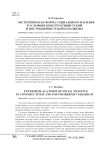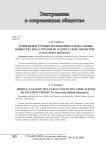История. Экстремизм в современном обществе. Рубрика в журнале - Гуманитарий: актуальные проблемы науки и образования

Extremism as a form of social violence in constructivist and post-modernist paradigm
Статья научная
The article analyzes the phenomenon of extremism. The phenomenon of extremism as a form of social violence is to be considered relevantly in terms of a constructivist and postmodern paradigm. In this connection, the violence, becoming a source of extremism, realizes such features as coercion, destructive influence, motivation, awareness. The mixed assessment of the phenomenon of violence is always present. Social philosophy, analyzing the society and the human place in it, dealt with the studies of forms and methods of counteraction. To a large extent extremism is associated with violence, taking into account the political component, involving review of the category of power. Considering the political nature of social violence, it should be noted that there will be a threat to use different forms, methods and means of coercion and oppression in relation to other groups, classes, states, social systems. The basis for the consideration of political violence becomes a class approach. The author defines violence as a physical coercion of a person for the purpose of submission of his will. Ideologically postmodernism disarms the concept aims to recreate the plurality of ideologies, which implement clashes with one another, which in its main form leads to the destruction of the existing management system and dissonance in the world. Such deconstruction becomes the foundation of the modern world. Constructivism, as one of the trends of modern non-classical epistemology, tends to re-invent the concept of postmodernism. The consideration of these components in the analysis of the phenomenon of extremism requires a new conceptual rethinking of violence as it is.
Бесплатно

Статья научная
В статье поднимаются вопросы о соотношении традиционных и новых регуляторов межконфессиональных отношений на Ближнем Востоке, о характеристике ускоренных процессов внутри религиозных общин, нередко сопряженных с воинственным активизмом, о степени архаизации общественной жизни и религиозного сознания, о самой возможности сосуществования конфессиональных общин в случае успеха исламистских проектов, а также о культурной составляющей того «джихада», который исламисты ведут в направлении истребления исторической памяти и национального самосознания местного населения. Вопрос внешнего влияния прямо связан с искусственным акцентом на религиозный аспект противостояния.
Бесплатно

